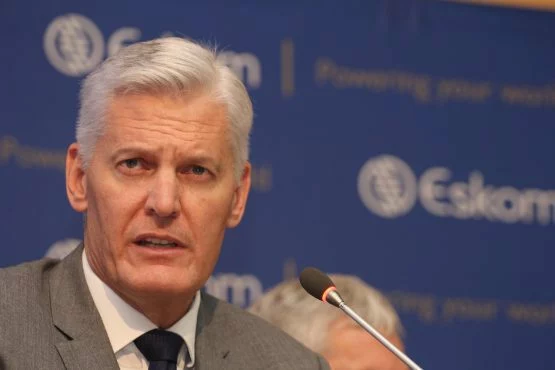Johannesburg – Eskom has reiterated its commitment to improving the arrear municipal debt that has ballooned to R35.3 billion for the financial year ending March 2021.
To address this, among other challenges, Eskom said it was working closely with the Political Task Team led by the Deputy President, David Mabuza.
Outlining its financial results on Tuesday, Eskom Chief Financial Officer, Calib Cassim, said the outstanding municipal debt rose by 26% to R35.3 billion.
“Cost savings alone is not a solution,” Cassim stressed.
In addition to working with the office of the Deputy President, the power utility is also embarking on active partnership agreements with some of the municipalities, in which it hopes to arrest the spiral in outstanding debt.
“Eskom’s capital position must be resolved. Cost-reflective tariffs and resolving the municipal arrear debt are required to achieve the successful implementation of Eskom’s turnaround and to ensure long-term financial sustainability. For its part, Eskom continues its concerted effort to reduce the debt and to improve gearing,” said Cassim.
Meanwhile, the State-owned entity has reported that it has so far secured R16.2 billion of its R41.6 billion funding requirement for the 2022 financial year.
In addition, the strengthening of the rand had a significant positive impact on results for the year, the entity said.
However, Cassim stated that Eskom’s liquidity remained a concern due to the high cost of servicing the outstanding debt, working capital requirements, escalating municipal arrear debt, and sub-investment grade level credit ratings, among other factors.
“This picture is likely to remain unchanged in the short- to medium-term. However, reliance on government support mitigates the material uncertainty regarding Eskom’s status as a going concern,” said Cassim.
Gross debt
Eskom admitted that the performance during the year under review was challenging.
While the SOE managed to reduce its gross debt by R81.9 billion, a 16.9% reduction, R401.8 billion outstanding debt remains remained.
According to Eskom, it attracted a net finance cost of R31.5 billion, turning an operating profit of R5.8 billion into a loss of R18.9 billion after tax.
Meanwhile, it achieved operational cost savings of R14.4 billion, against a target of R14.1 billion.
Although sales volumes were down, primary energy costs increased by 3.4% to R115.9 billion, while normalised operating costs increased by 1.6%.
Impact of COVID-19
Eskom said it was not spared from the worst effects of the COVID-19 pandemic.
“The slowdown of economic activity due to the pandemic led to an unprecedented decline in sales, which fell 6.7% from the previous year. Sadly, the losses Eskom suffered because of the COVID-19 pandemic were not limited to our finances,” said André de Ruyter, Eskom Group Chief Executive.
De Ruyter announced that the entity lost 153 staff members to the deadly virus, including 17 contractors as of August 2021.
“Our sincere condolences go to the affected families,” said De Ruyter.
However, he said believes that every crisis brings with it an opportunity.
“In this case, Eskom used unfortunate lower demand presented by the lockdown to conduct much-needed maintenance at some of our power stations.”
In addition, revenue increased to R204.3 billion during the year, from R199.5 billion the previous year.
This was mainly attributed to an 8.76% annual increase in the electricity tariff during the period, offset by a reduction of 6.7% in sales volume.
Vandalism
Eskom has also noted improvement in transmission and distribution network performance.
Meanwhile, high levels of asset vandalism, equipment theft, and overloaded networks continued to increase breakdowns and maintenance costs, limiting the return on investment and posing a safety risk.
However, the SOE said it was concerned by the increase in electricity theft and illegal connections, which has necessitated load reduction in areas with a high incidence of illegal connections.
De Ruyter explained that Eskom’s long-term objectives of achieving operational and financial sustainability are dependent on the successful implementation of the turnaround plan currently underway.
“The turnaround plan, which is overseen by a diverse executive committee, comprising 56% Black female representation, focuses on operations recovery, improving the income statement, strengthening the balance sheet, driving business separation, and bringing about a winning, can-do culture,” said De Ruyter.
– SAnews.gov.za
Follow @SundayWorldZA on Twitter and @sundayworldza on Instagram, or like our Facebook Page, Sunday World, by clicking here for the latest breaking news in South Africa. To Subscribe to Sunday World, click here.
Sunday World



